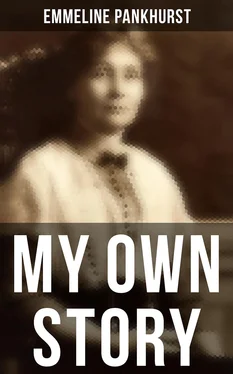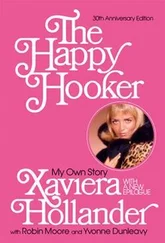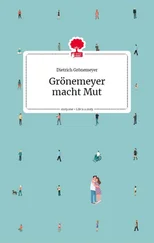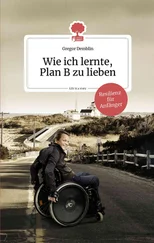1 ...7 8 9 11 12 13 ...18 As soon as order was restored Christabel stood up and repeated the question: "Will the Liberal Government, if returned, give votes to women?" Again Sir Edward Grey ignored the question, and again a perfect tumult of shouts and angry cries arose. Mr. William Peacock, chief constable of Manchester, left the platform and came down to the women, asking them to write their question, which he promised to hand to the speaker. They wrote: "Will the Liberal Government give votes to working-women? Signed, on behalf of the Women's Social and Political Union, Annie Kenney, member of the Oldham committee of the card-and blowing-room operatives." They added a line to say that, as one of 96,000 organised women textile-workers, Annie Kenney earnestly desired an answer to the question.
Mr. Peacock kept his word and handed the question to Sir Edward Grey, who read it, smiled, and passed it to the others on the platform. They also read it with smiles, but no answer to the question was made. Only one lady who was sitting on the platform tried to say something, but the chairman interrupted by asking Lord Durham to move a vote of thanks to the speaker. Mr. Winston Churchill seconded the motion, Sir Edward Grey replied briefly, and the meeting began to break up. Annie Kenney stood up in her chair and cried out over the noise of shuffling feet and murmurs of conversation: "Will the Liberal Government give votes to women?" Then the audience became a mob. They howled, they shouted and roared, shaking their fists fiercely at the woman who dared to intrude her question into a man's meeting. Hands were lifted to drag her out of her chair, but Christabel threw one arm about her as she stood, and with the other arm warded off the mob, who struck and scratched at her until her sleeve was red with blood. Still the girls held together and shouted over and over: "The question! The question! Answer the question!"
Six men, stewards of the meeting, seized Christabel and dragged her down the aisle, past the platform, other men following with Annie Kenney, both girls still calling for an answer to their question. On the platform the Liberal leaders sat silent and unmoved while this disgraceful scene was taking place, and the mob were shouting and shrieking from the floor.
Flung into the streets, the two girls staggered to their feet and began to address the crowds, and to tell them what had taken place in a Liberal meeting. Within five minutes they were arrested on a charge of obstruction and, in Christabel's case, of assaulting the police. Both were summonsed to appear next morning in a police court, where, after a trial which was a mere farce, Annie Kenney was sentenced to pay a fine of five shillings, with an alternative of three days in prison, and Christabel Pankhurst was given a fine of ten shillings or a jail sentence of one week.
Both girls promptly chose the prison sentence. As soon as they left the court-room I hurried around to the room where they were waiting, and I said to my daughter: "You have done everything you could be expected to do in this matter. I think you should let me pay your fines and take you home." Without waiting for Annie Kenney to speak, my daughter exclaimed: "Mother, if you pay my fine I will never go home." Before going to the meeting she had said, "We will get our question answered or sleep in prison to-night." I now knew her courage remained unshaken.
Of course the affair created a tremendous sensation, not only in Manchester, where my husband had been so well known and where I had so long held public office, but all over England. The comments of the press were almost unanimously bitter. Ignoring the perfectly well-established fact that men in every political meeting ask questions and demand answers of the speakers, the newspapers treated the action of the two girls as something quite unprecedented and outrageous. They generally agreed that great leniency had been shown them. Fines and jail-sentences were too good for such unsexed creatures. "The discipline of the nursery" would have been far more appropriate. One Birmingham paper declared that "if any argument were required against giving ladies political status and power it had been furnished in Manchester." Newspapers which had heretofore ignored the whole subject now hinted that while they had formerly been in favour of women's suffrage, they could no longer countenance it. The Manchester incident, it was said, had set the cause back, perhaps irrevocably.
This is how it set the cause back. Scores of people wrote to the newspapers expressing sympathy with the women. The wife of Sir Edward Grey told her friends that she considered them quite justified in the means they had taken. It was stated that Winston Churchill, nervous about his own candidacy in Manchester, visited Strangeways Gaol, where the two girls were imprisoned, and vainly begged the governor to allow him to pay their fines. On October 20, when the prisoners were released, they were given an immense demonstration in Free-Trade Hall, the very hall from which they had been ejected the week before. The Women's Social and Political Union received a large number of new members. Above all, the question of women's suffrage became at once a live topic of comment from one end of Great Britain to the other.
We determined that from that time on the little "Votes For Women" banners should appear wherever a prospective member of the Liberal Government rose to speak, and that there should be no more peace until the women's question was answered. We clearly perceived that the new Government, calling themselves Liberal, were reactionary so far as women were concerned, that they were hostile to women's suffrage, and would have to be fought until they were conquered, or else driven from office.
We did not begin to fight, however, until we had given the new Government every chance to give us the pledge we wanted. Early in December the Conservative Government had gone out, and Sir Henry Campbell-Bannerman, the Liberal leader, had formed a new Cabinet. On December 21 a great meeting was held in Royal Albert Hall, London, where Sir Henry, surrounded by his cabinet, made his first utterance as Prime Minister. Previous to the meeting we wrote to Sir Henry and asked him, in the name of the Women's Social and Political Union, whether the Liberal Government would give women the vote. We added that our representatives would be present at the meeting, and we hoped that the Prime Minister would publicly answer the question. Otherwise we should be obliged publicly to protest against his silence.
Of course Sir Henry Campbell-Bannerman returned no reply, nor did his speech contain any allusion to women's suffrage. So, at the conclusion, Annie Kenney, whom we had smuggled into the hall in disguise, whipped out her little white calico banner, and called out in her clear, sweet voice: "Will the Liberal Government give women the vote?"
At the same moment Theresa Billington let drop from a seat directly above the platform a huge banner with the words: "Will the Liberal Government give justice to working-women?" Just for a moment there was a gasping silence, the people waiting to see what the Cabinet Ministers would do. They did nothing. Then, in the midst of uproar and conflicting shouts, the women were seized and flung out of the hall.
This was the beginning of a campaign the like of which was never known in England, or, for that matter, in any other country. If we had been strong enough we should have opposed the election of every Liberal candidate, but being limited both in funds and in members we concentrated on one member of the Government, Mr. Winston Churchill. Not that we had any animus against Mr. Churchill. We chose him simply because he was the only important candidate standing for constituencies within reach of our headquarters. We attended every meeting addressed by Mr. Churchill. We heckled him unmercifully; we spoiled his best points by flinging back such obvious retorts that the crowds roared with laughter. We lifted out little white banners from unexpected corners of the hall, exactly at the moment when an interruption was least desired. Sometimes our banners were torn from our hands and trodden under foot. Sometimes, again, the crowds were with us, and we actually broke up the meeting. We did not succeed in defeating Mr. Churchill, but he was returned by a very small majority, the smallest of any of the Manchester Liberal candidates.
Читать дальше












